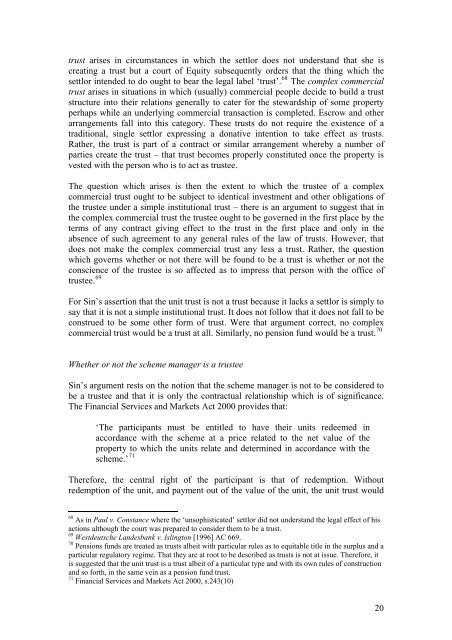The Unbearable Lightness of Property - alastairhudson.com
The Unbearable Lightness of Property - alastairhudson.com
The Unbearable Lightness of Property - alastairhudson.com
Create successful ePaper yourself
Turn your PDF publications into a flip-book with our unique Google optimized e-Paper software.
trust arises in circumstances in which the settlor does not understand that she is<br />
creating a trust but a court <strong>of</strong> Equity subsequently orders that the thing which the<br />
settlor intended to do ought to bear the legal label ‘trust’. 68 <strong>The</strong> <strong>com</strong>plex <strong>com</strong>mercial<br />
trust arises in situations in which (usually) <strong>com</strong>mercial people decide to build a trust<br />
structure into their relations generally to cater for the stewardship <strong>of</strong> some property<br />
perhaps while an underlying <strong>com</strong>mercial transaction is <strong>com</strong>pleted. Escrow and other<br />
arrangements fall into this category. <strong>The</strong>se trusts do not require the existence <strong>of</strong> a<br />
traditional, single settlor expressing a donative intention to take effect as trusts.<br />
Rather, the trust is part <strong>of</strong> a contract or similar arrangement whereby a number <strong>of</strong><br />
parties create the trust – that trust be<strong>com</strong>es properly constituted once the property is<br />
vested with the person who is to act as trustee.<br />
<strong>The</strong> question which arises is then the extent to which the trustee <strong>of</strong> a <strong>com</strong>plex<br />
<strong>com</strong>mercial trust ought to be subject to identical investment and other obligations <strong>of</strong><br />
the trustee under a simple institutional trust – there is an argument to suggest that in<br />
the <strong>com</strong>plex <strong>com</strong>mercial trust the trustee ought to be governed in the first place by the<br />
terms <strong>of</strong> any contract giving effect to the trust in the first place and only in the<br />
absence <strong>of</strong> such agreement to any general rules <strong>of</strong> the law <strong>of</strong> trusts. However, that<br />
does not make the <strong>com</strong>plex <strong>com</strong>mercial trust any less a trust. Rather, the question<br />
which governs whether or not there will be found to be a trust is whether or not the<br />
conscience <strong>of</strong> the trustee is so affected as to impress that person with the <strong>of</strong>fice <strong>of</strong><br />
trustee. 69<br />
For Sin’s assertion that the unit trust is not a trust because it lacks a settlor is simply to<br />
say that it is not a simple institutional trust. It does not follow that it does not fall to be<br />
construed to be some other form <strong>of</strong> trust. Were that argument correct, no <strong>com</strong>plex<br />
<strong>com</strong>mercial trust would be a trust at all. Similarly, no pension fund would be a trust. 70<br />
Whether or not the scheme manager is a trustee<br />
Sin’s argument rests on the notion that the scheme manager is not to be considered to<br />
be a trustee and that it is only the contractual relationship which is <strong>of</strong> significance.<br />
<strong>The</strong> Financial Services and Markets Act 2000 provides that:<br />
‘<strong>The</strong> participants must be entitled to have their units redeemed in<br />
accordance with the scheme at a price related to the net value <strong>of</strong> the<br />
property to which the units relate and determined in accordance with the<br />
scheme.’ 71<br />
<strong>The</strong>refore, the central right <strong>of</strong> the participant is that <strong>of</strong> redemption. Without<br />
redemption <strong>of</strong> the unit, and payment out <strong>of</strong> the value <strong>of</strong> the unit, the unit trust would<br />
68 As in Paul v. Constance where the ‘unsophisticated’ settlor did not understand the legal effect <strong>of</strong> his<br />
actions although the court was prepared to consider them to be a trust.<br />
69 Westdeutsche Landesbank v. Islington [1996] AC 669.<br />
70 Pensions funds are treated as trusts albeit with particular rules as to equitable title in the surplus and a<br />
particular regulatory regime. That they are at root to be described as trusts is not at issue. <strong>The</strong>refore, it<br />
is suggested that the unit trust is a trust albeit <strong>of</strong> a particular type and with its own rules <strong>of</strong> construction<br />
and so forth, in the same vein as a pension fund trust.<br />
71 Financial Services and Markets Act 2000, s.243(10)<br />
20













